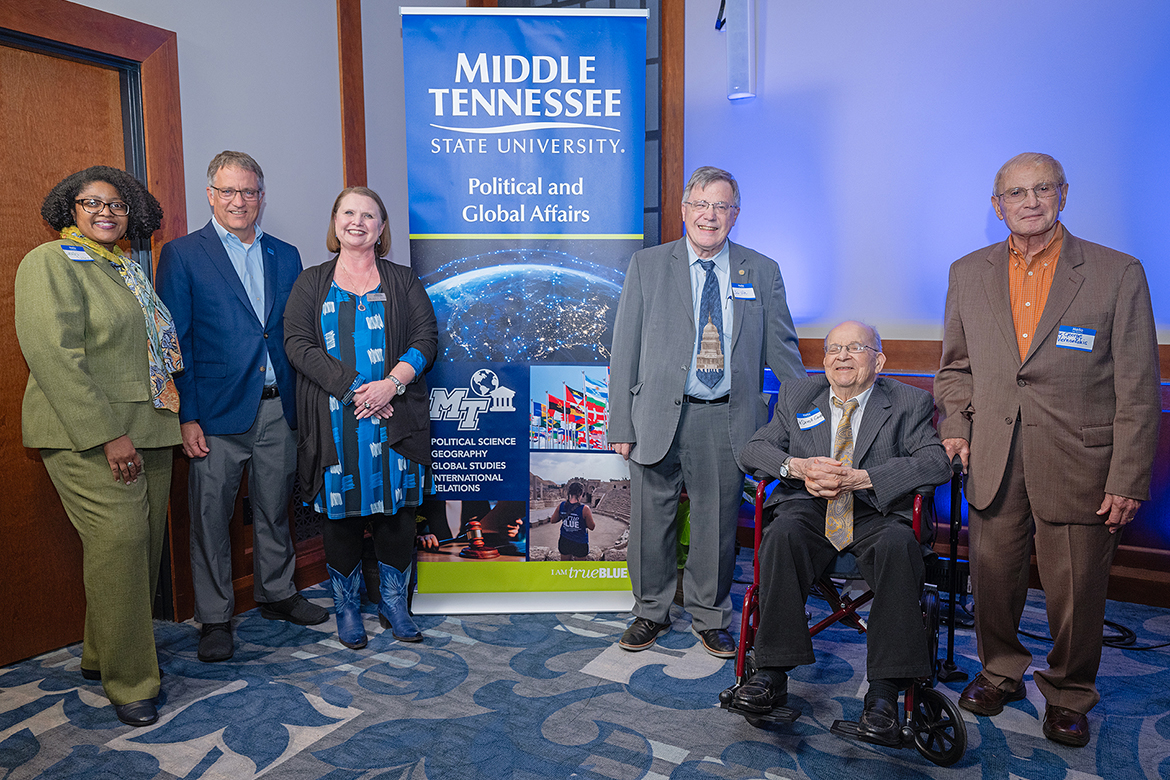
Global Studies and Human Geography
Explore global forces, cultures, and change. Global Studies grads thrive in diverse careers, grad studies, and international roles.
Global Studies and Human Geography, Global Studies Concentration, B.S.
The Global Studies Concentration is designed for students who wish to explore the world's peoples, cultures, and countries while developing the skills needed to work and thrive in the modern world. The focus is on how globalization is changing societies, their cultures and attitudes, politics, and economics. The effects of rapid globalization are reshaping most fields, from health care to business and logistics, from music to food security. Global Studies prepare students to succeed in this changing world.
The Global Studies Concentration is unique in several ways:
- All GS students go abroad at least once; an international experience is integrated into the curriculum. In recent years, GS students have studied abroad in over 30 different countries.
- GS is designed to be interdisciplinary. Students complete a core of courses in Global Studies, but then choose 20% to 40% of their courses from other departments across campus.
- Global Studies examines the relationships among culture, politics, economics, business, and so on, and students select courses from these different areas to round out their program. students student select one of seven World Regional Minors to develop area expertise. They choose a minor from among Asian Studies, African Studies, Jewish and Holocaust Studies, Latin American Studies, Middle East Studies, Modern European Studies, and Russian Studies.
Courses in the Global Studies incorporate many experiential activities. These allow students to directly interact with practitioners in the field and groups representing culture groups and organization in the region. Between these experience and their time abroad, students develop proven abilities to work in globalized professions and with a network of professional connections.
The Global Studies concentration thus provides students with a systematic awareness of the global forces and processes directly transforming contemporary societies and individuals. Global Studies students graduate with the tools to pursue specialized graduate work, professional service, and careers in public and private sectors-here and abroad. Many GS graduates work abroad with non-profits, multi-national corporations, and in international education.
News Briefs

MTSU merges areas to create new Department of Political and Global Affairs
Middle Tennessee State University’s College of Liberal Arts has merged two departments to create the Department of Political and Global Affairs.[ Read More ]
News Briefs

MTSU merges areas to create new Department of Political and Global Affairs
Middle Tennessee State University’s College of Liberal Arts has merged two departments to create the Department of Political and Global Affairs.[ Read More ]
Related Media

Global Studies and Human Geography, Global Studies Concentration, B.S.
Global Studies and Human Geography Careers
The study of Global Studies and Human Geography opens many doors. Students develop transferable work skills that are highly valued by employers, including analysis, research, writing, problem solving, and, especially, knowledge of other cultures and languages.
Global Studies and Human Geography students are well prepared to move into professional careers. All students in the Global Studies concentration go abroad at least once and have a proven ability to thrive and succeed in a cross-cultural, globalized environment, and all students in the Human Geography concentration complete an internship and a series of professional skills courses.
Typical Career Paths
Global Studies students graduate with skills valued by employers with global reach, and a majority move into:
- The non-profit sector, working in executive positions in domestic or global organizations dealing with a wide range of issues, including human trafficking, political refugees, migration, development, and trade.
- The for-profit sector, working both domestically and around the world for businesses with international operations.
- International education, teaching abroad.
- Graduate school.
Human Geography students graduate with skills that apply across multiple sectors, but valued a majority move into:
- City and regional planning, working with consulting firms or government agencies.
- The non-profit sector, working in executive positions across a wide range of domestic or global organizations dealing with migration, development, medical geography, and more.
- The parks and tourism industry.
- Graduate school.
Employers of MTSU alumni include
- SALT International
- Foreign Service
- Multinational corporations
- Peace Corps
- Nonprofit organizations
- Service agencies
- International education

MTSU’s Career Development Center
MTSU offers a comprehensive Career Development Center that serves students throughout the full student experience and beyond. They collaborate with faculty and staff to equip students with the tools to be marketable to the world of work and continuing education.
Students can schedule an appointment or check online resources and job boards at mtsu.edu/career.
Students can find current internship opportunities by talking to faculty and visiting the University job and internship board called Handshake.
Wondering what you can do with your major? Check out our What Can I Do with A Major In guides.



MTSU offers a teacher licensure in Global Studies and Human Geography. The requirements for this are listed in the Requirements button above.
The Human Geography teacher licensure program offers a comprehensive skill set designed to understand the diversity of cultures and socio-geographic complexities found in human societies. Human geographers seek to understand how humans uniquely create, manipulate, and adapt to the places they inhabit by examining natural environments, cultural practices, and economic and political systems.
Knowledge gained from the Human Geography concentration is valuable as contemporary societies are interacting globally with one another as never before. Human geographers identify and comprehend these changes and find solutions to a variety of sociocultural problems taking place. This marketable skill set is attractive to a wide range of employers in the public, private, and nonprofit sectors.
Geography is offered in nearly all high school curriculia, and AP Human Geography is now taken by over 15,000 students each year. There is a real demand for qualified geography secondary education teachers.
Students in the licensure program complete the Secondary Education Minor and choose an additional minor in:
- History
- Political Science, or
- Economics
Human Geography Teacher Licensure students thus earn their primary license in geography, but are also well prepared an add-on endorsement in one of these other content areas, increasing their marketability.
Professional Licensure Disclosure
MTSU discloses that the Bachelor of Science (BS) in Global Studies and Human Geography, Human Geography Teacher Licensure is a teacher licensure preparation program accredited by the Council for the Accreditation of Educator Preparation (CAEP) and approved by the Tennessee Department of Education. Admission to an undergraduate teacher licensure preparation program does not guarantee that students will obtain a teacher license. Successful program completion meets the educational requirements to apply for a practitioner teacher licensure in Tennessee.
The BS Global Studies and Human Geography, Human Geography Teacher Licensure disclosure provided on MTSU’s professional licensure disclosure website indicates the states and territories where MTSU has determined, through reasonable and good faith effort, that the program does or does not meet the educational requirements for other US states and territories. Licensing authorities for each state set and enforce their own requirements and standards, which are subject to change. Current and prospective students not located in Tennessee or who plan to seek licensure or certification outside the state of Tennessee should contact the appropriate state licensing agency or board and discuss their plans with an advisor and the MTSU Office of Teacher Licensure before enrolling in the program to ensure they have the most up-to-date information and guidance regarding licensure requirements.

CONTACT US


















